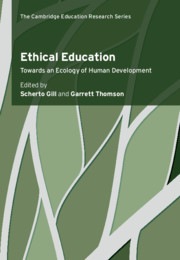Book contents
- Ethical Education
- Ethical Education
- Copyright page
- Contents
- Contributors
- General Introduction
- Part I Theoretical Perspectives on Ethical Education
- Part II Pedagogical Approaches to Ethical Education
- Part III Ethical Education in Practices
- Introduction to Part III
- 7 Re-Learning the Value of Direct Experience
- 8 Cultivating Inner Qualities
- 9 Ethical Relationships in Secondary Classrooms
- Conclusion to Part III
- 10 Towards Systemic Transformation
- Notes
- Bibliography
- Index
10 - Towards Systemic Transformation
from Part III - Ethical Education in Practices
Published online by Cambridge University Press: 30 June 2020
- Ethical Education
- Ethical Education
- Copyright page
- Contents
- Contributors
- General Introduction
- Part I Theoretical Perspectives on Ethical Education
- Part II Pedagogical Approaches to Ethical Education
- Part III Ethical Education in Practices
- Introduction to Part III
- 7 Re-Learning the Value of Direct Experience
- 8 Cultivating Inner Qualities
- 9 Ethical Relationships in Secondary Classrooms
- Conclusion to Part III
- 10 Towards Systemic Transformation
- Notes
- Bibliography
- Index
Summary
Chapter 10 brings the different chapters together and responds to the question: ‘How might a public education system become more ethical?’ In other words, it asks how an education system itself can be conducive to and embody ethical living in relationships, and assumes that such ethical living will require concern for the well-being of persons and will constitute a vital aspect of one’s own well-being. It clarifies that educational system isn’t a collection of schools, but instead, it is the way in which various institutions are interrelated according to the principles that define the way they work together. These institutions include schools, examination boards, teacher training colleges, local authorities, the national curriculum authority, the ministry, national school inspection offices, various institutional employers, a framework of laws, and from there, the wider global economy. To propose ethically oriented systemic transformation, the chapter outlines the nature of an educational system that is centred around the well-being of persons in the four principles, including non-instrumentalisation, whole-person development, well-being and learning as human becoming. It then explores how these principles can be applied to the design of the system, and to key aspects of schooling, such as curriculum, pedagogy, evaluation and learning communities.
Keywords
- Type
- Chapter
- Information
- Ethical EducationTowards an Ecology of Human Development, pp. 171 - 188Publisher: Cambridge University PressPrint publication year: 2020

